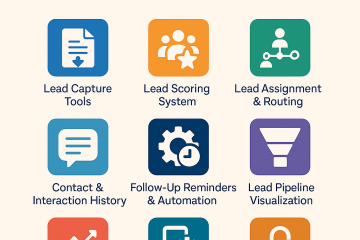Managing leads effectively is key to driving sales and business growth. A well-organized system can help businesses capture, qualify, and convert leads into customers. With the right lead management software, companies can track leads, follow up effectively, and increase conversions.
In this article, we will explore how lead management works and how using a lead management system can help you increase sales. Whether you’re running a small business or working with a large organization, optimizing your lead process is essential for success.
What is Lead Management?
Lead management refers to tracking and managing potential customers as they move through the sales funnel. It involves several stages: capturing leads, qualifying them, nurturing them, and converting them into sales.
An efficient lead management software automates these processes, organizing leads in one place and ensuring no leads are lost. Here are the stages of lead management:
-
Lead Capture: Gathering information from potential customers through various channels like websites, emails, and social media.
-
Lead Qualification: Evaluating leads to determine their potential for conversion.
-
Lead Nurturing: Building relationships with leads over time to move them through the sales funnel.
-
Lead Conversion: Turning qualified leads into paying customers.
Why is Lead Management Important?
Effective lead management is essential for businesses looking to increase their sales. Without a proper system in place, companies risk losing valuable leads. Here are some reasons why lead management is crucial:
-
Better Organization: Lead management software organizes all your lead information in one place. This makes it easy for the sales team to access and track leads.
-
Improved Lead Nurturing: Not all leads are ready to buy immediately. Lead management systems help businesses stay in touch with leads over time, offering valuable content and timely reminders.
-
Increased Efficiency: Automating follow-ups, reminders, and lead activity tracking saves time and allows the sales team to focus on closing deals.
-
Higher Conversion Rates: With proper qualification and engagement, businesses can increase conversion rates by focusing efforts on leads most likely to buy.
-
Analytics and Tracking: Lead management systems provide data on how leads are interacting with your business, helping you improve your strategies.
How Lead Management Software Helps Drive Sales
An effective lead management software streamlines the lead process, automating tasks and providing valuable insights that boost sales. Here’s how it contributes to sales growth:
1. Streamlined Lead Capture
Capturing leads from various sources—websites, social media, or email campaigns—can be challenging. Lead management software integrates with these channels, ensuring all leads are stored in one system. This reduces the chance of missing out on valuable leads and ensures businesses never lose track of potential customers.
2. Lead Scoring and Qualification
Not all leads are equal. Some are closer to making a purchase, while others need more nurturing. Lead management software helps by scoring leads based on factors like interest level, demographics, and behavior. This allows businesses to prioritize high-quality leads and focus on those most likely to convert.
3. Automated Follow-Ups and Reminders
Following up with leads is time-consuming but essential. Lead management software automates this process by sending reminders and follow-up emails. This ensures that no lead is forgotten and every opportunity is pursued, improving the chances of conversion.
4. Personalized Communication
To nurture leads effectively, personalized communication is essential. Lead management software segments leads based on various criteria, allowing businesses to tailor messages and offers based on the lead’s interests or position in the sales funnel. Personalized communication builds trust, increasing the likelihood that leads will become customers.
5. Collaboration Between Sales and Marketing
Sales and marketing teams need to work together to turn leads into customers. Lead management software makes this easy by providing a shared platform for lead data and insights. Sales teams can track the progress of each lead, and marketing teams can adjust campaigns to attract high-quality leads.
Key Features of Lead Management Software
When choosing lead management software, it’s important to select a system that suits your business needs. Here are some key features to look for:
-
Lead Capture Forms: Customizable forms that capture lead information from your website or landing pages.
-
Lead Scoring: Automatically scores and qualifies leads based on predefined criteria.
-
CRM Integration: Integrates with your CRM to ensure all lead data is stored in one place.
-
Automated Workflows: Set up automated reminders, follow-ups, and task management to ensure timely lead engagement.
-
Analytics and Reporting: Track conversion rates, lead sources, and other metrics to refine your strategies.
-
Email Marketing Integration: Integrates with email marketing tools to automate lead nurturing campaigns.
-
Mobile Access: Manage leads and follow-ups on the go through mobile apps or web interfaces.
How to Choose the Right Lead Management Software
Selecting the right lead management software is essential for improving your sales process. Consider these factors when choosing a system:
-
Ease of Use: The software should be user-friendly and easy to integrate with existing systems.
-
Customization: Choose a system that allows you to customize lead forms, workflows, and reporting features.
-
Integration Capabilities: Ensure the software integrates with other tools you use, such as your CRM, email marketing platform, and analytics tools.
-
Scalability: As your business grows, you’ll need a system that can scale with you. Choose software that can handle more leads and users as your business expands.
-
Support and Training: Ensure the software provider offers adequate support, training, and resources to help you get the most out of the system.
How Lead Management Systems Improve Sales Performance
An effective lead management system does more than just track leads. It improves overall sales performance by providing the tools and data needed to close more deals. Here’s how:
-
Increased Sales Efficiency: Automating follow-ups and tracking ensures the sales team doesn’t waste time on unqualified leads. By focusing only on high-potential leads, sales teams become more efficient and productive.
-
Better Lead Engagement: Personalized follow-ups and timely reminders keep leads engaged and moving through the sales funnel, resulting in higher conversion rates.
-
Data-Driven Decisions: Lead management software provides valuable insights into the sales process. By analyzing lead behavior, businesses can identify which strategies work and refine their approach.
-
Enhanced Customer Experience: By organizing leads and responding quickly to their needs, businesses can provide a more positive experience that builds trust and increases customer loyalty.
Conclusion
In conclusion, lead management is essential for businesses aiming to increase their sales and improve their overall sales performance. By using lead management software, businesses can efficiently capture, qualify, nurture, and convert leads. Automating repetitive tasks, personalizing communication, and providing insights into the sales process will help your team work smarter, not harder.
Whether you’re a small startup or a large enterprise, implementing a lead management system is crucial for driving more sales and increasing revenue. By improving lead organization, engagement, and conversion, businesses can see significant improvements in their sales outcomes.
With the right lead management software in place, you can streamline your sales process, improve lead quality, and ultimately close more deals.


0 Comments